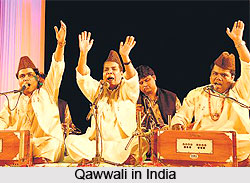 Qawwali is a form of Sufi devotional music popular in South Asia and the history of Qawwali stretches back more than 700 years, particularly in areas with a historically strong Muslim presence, like southern Pakistan, and parts of North India. The style is rare, though not entirely obscure, in North and West Pakistan, Bangladesh, and Kashmir. Qawwali is a vibrant musical tradition, where often listeners, and even artists themselves, are transported to a state of wajad, a trance-like state where they feel at one with God, generally considered to be the height of spiritual elation in Sufism, and the ultimate goal of the practice.
Qawwali is a form of Sufi devotional music popular in South Asia and the history of Qawwali stretches back more than 700 years, particularly in areas with a historically strong Muslim presence, like southern Pakistan, and parts of North India. The style is rare, though not entirely obscure, in North and West Pakistan, Bangladesh, and Kashmir. Qawwali is a vibrant musical tradition, where often listeners, and even artists themselves, are transported to a state of wajad, a trance-like state where they feel at one with God, generally considered to be the height of spiritual elation in Sufism, and the ultimate goal of the practice.
Qawwali is originally performed at Sufi shrines or dargahs throughout the subcontinent; it has also gained mainstream popularity. Qawwali music received international popularity through the work of the late Pakistani singer Nusrat Fateh Ali Khan, largely owing to several releases on the Real World label, followed by live appearances at Womad festivals. Other famous Qawwali singers include Pakistan`s Sabri Brothers.
Although famous throughout the world, the haven for Qawwali music remains the Punjab province of Pakistan from where it gained entry into the mainstream commercial music industry and international fame. The roots of Qawwali can be traced back to 8th century Persia. During the first major migration from Persia, in the 11th century, the musical tradition of Sema migrated to the Indian subcontinent, Turkey and Uzbekistan. Amir Khusro Dehelvi of the Chisti order of Sufis is credited with fusing the Persian and Indian musical traditions to create Qawwali. The word Sama is often still used in Central Asia and Turkey to refer to forms very close to Qawwali, and in India, Pakistan and Bangladesh, the formal name used for a session of Qawwali is Mehfil-e-Sama.
Qawwali is the style of singing of Qaww?ls, Qaul (Arabic) is an "utterance (of the prophet)" and Qaww?l is someone who often repeats (sings) a Qaul. The songs, which constitute the qawwali repertoire, are mostly in Urdu and Punjabi, almost equally divided between the two, although there are several songs in Persian, Brajbhasha and Siraiki. There is also qawwali in some regional languages like Chhote Babu Qawwal sings in Bengali, but the regional language tradition is somewhat ambiguous. Also, the sound of the regional language qawwali can be completely different from that of the real qawwali. This is certainly true of Chhote Babu Qawwal, whose sound is much similar to Baul music than to the qawwali of Nusrat Fateh Ali Khan.
The poetry of the Qawali song is implicitly understood to be spiritual in its meaning, even though the lyrics can sometimes sound passionately secular, or outright hedonistic. The prime themes of qawwali are love, devotion and longing (of man for the Divine). Since the origin of Qaww?li, the songs are classified by their content into several categories. A hamd (arabic for praise) is a song in praise of Allah. Qaww?li is categorized into various forms according to its purpose and ways of singing. This form of singing have become immensely popular in present days, not only in functions like weddings and parties but also in Bollywood movies.




















